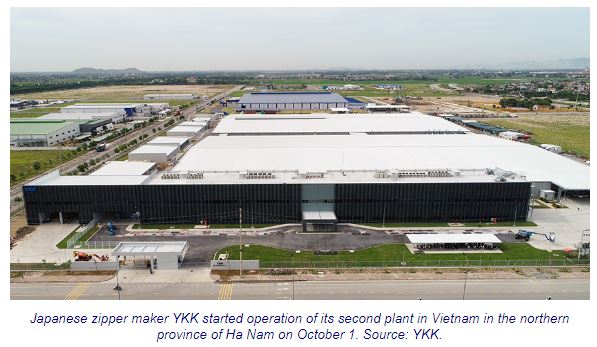World’s largest zipper manufacturer YKK opens US$60-million plant in Vietnam
Major zipper maker YKK Corporation started operating its second plant with an investment of US$59.9 million in Vietnam this week, aiming to meet growing demands for zippers in the world market, Japan Times reported.
The plant specializes in producing zippers and raw materials for the garment industry with a scale of 420 million products per year.
The Japanese company plans to increase production capacity in Vietnam by 40% in the fiscal year through March 2021, compared with fiscal 2017.
YKK Vietnam, YKK’s local arm, established the plant in the Dong Van III industrial zone in the northern province of Ha Nam, some 40 kilometers south of Hanoi, with total investment of $59.9 million, according to a statement released by YKK on Tuesday.
Adding to the existing plant in the southern province of Dong Nai, the new 51,000-square-meter site will shorten delivery time to garment makers in northern Vietnam.
Recently, Vietnam’s participation in the Comprehensive Partnership and Trans-Pacific Partnership Agreement (CPTPP) and the upcoming EU-Vietnam Free Trade Agreement (EVFTA) has prompted foreign producers to expand in the country’s textile and garment industry.
Vu Duc Giang, chairman of the Vietnam Textile and Apparel Association, forecast the local textile and garment industry will maintain high growth potential until 2035 with an estimated export turnover of about US$200 billion.
The growing investment activities in factories producing textile accessories in Vietnam are thanks to them being targeted as priority investment in accordance with Decision No. 68 of the Prime Minister approving the program of supporting industry development in 2016-2025, including sewing thread textiles and garments; chemicals, auxiliaries, dyes for dyeing finishing of fabrics; garment accessories: chamois, mex, zipper, ribbon, among others.
The move is expected to support the government’s effort to complete a supply chain in the garment and textile industry, with the aim of reducing the sector’s dependence on imported raw materials.


 Thailand
Thailand




